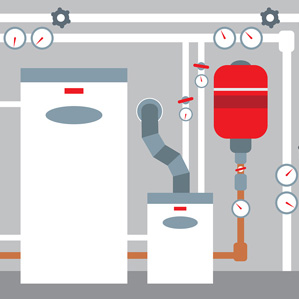A fuel oil spill can cause a gnarly smell that is very challenging to get rid of. You may even have heard horror stories of people who never get rid of this nasty reek.
It’s best to deal with fuel oil spills on concrete quickly, since this material is quite porous. it tends to absorb materials and odors rather easily. You can deal with small spills on your own, but a major basement flood would require professional help to resolve.
How to Remove Furnace Oil Smell from House
1 Tide Laundry Detergent Powder Soak-up
To soak up a fuel oil spill and get rid of the odor, spread some Tide laundry detergent powder over the affected area. Leave it in place overnight. The soap will turn beige as it soaks up the fuel oil. It will not eliminate the smell entirely, but will help to lower the stank factor significantly. Use a wet/dry vacuum or a broom to sweep it up. Repeat if you still notice a smell after the first application.
2 White Vinegar Bowl
White vinegar is used for a number of purposes around the house, and absorbing odors is just one of them. The advantage of choosing this solution is that it is cheap and easy to obtain. Simply pour the white vinegar into a bowl or pan. Place it in the room where you have noticed the smell and close the door. It may take a couple of weeks for the vinegar to do its work, but it will absorb the stank.
3 Kitty Litter Odor Absorber
If you need to soak up oil from a spill on a concrete floor, start by putting down some kitty litter. It will absorb the moisture from the oil. Leave it in place overnight or for a couple of days. To help this process along, consider stepping on the powder with your feet to get all the liquid up fast. Then use a broom and dustpan to sweep it up. Reapply if the floor still feels wet.
4 Muriatic Acid Clean-up
Muriatic acid is not a cleaner you should be trifling with. It should only be considered when other options have not worked. Be sure that the area you are working in is well ventilated and that you are wearing protective clothing and goggles or a face shield throughout the process.
Start by wetting the concrete to be cleaned. Pour a gallon of water into a five-gallon plastic pail. Add 12 ounces of muriatic acid to the water. Stir the solution with a long-handled scrub brush or a paint stir stick.
Next, scrub the concrete with a brush. Do not pour the acid and water mixture onto the concrete. Do not leave it on for more than 10 minutes. Rinse the area with clean water. Brush away any loose material and rise again.
You will need to neutralize the acid. Pour a gallon of water into a two-gallon pail of water and add a cup of ammonia. Brush the ammonia and water over the clean surface. Rinse with clean water.
Next, you will need to neutralize any remaining acid mix. Add a gallon of water to the five-gallon pail of water. Pour in baking soda while adding in another gallon of water. Keep adding baking soda and water until the contents of the bucket stop fizzing. At this point, you can safely dispose of the contents down a sink or a storm drain.
Remove Furnace Oil Smell with Speciality Products
1 Fuel Oil Odor Neutralizer
If necessity is the mother of invention, you can probably rest assured that you aren’t the first person who has ever come up against the issue of a furnace oil spill and the resulting stink. Contact a HVAC supply house to ask about an odor neutralizing product for fuel oil. This is not the kind of item you can get off the shelf at your local hardware store, but you will be able to find it at a specialty dealer like that.
2 Diamataceous Earth to Absorb the Smell
While kitty litter is good at absorbing unwanted odors, it has some issues. It will clump, stick to the soles of your shoes and will track through your house. For about the same amount of coin, you can visit an auto parts shop and buy a bag of Diamataceous Earth (floor dry). This product is made of clay and dead sea critters. Apply it to the floor, grind it in with your boots and sweep it up. It will also remove “normal” dirt from a concrete floor.
[contact]

